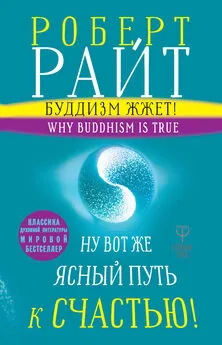Роберт Райт - Буддизм жжет! Ну вот же ясный путь к счастью! Нейропсихология медитации и просветления
- Название:Буддизм жжет! Ну вот же ясный путь к счастью! Нейропсихология медитации и просветления
- Автор:
- Жанр:
- Издательство:Литагент АСТ
- Год:2018
- Город:Москва
- ISBN:978-5-17-111724-5
- Рейтинг:
- Избранное:Добавить в избранное
-
Отзывы:
-
Ваша оценка:
Роберт Райт - Буддизм жжет! Ну вот же ясный путь к счастью! Нейропсихология медитации и просветления краткое содержание
Буддизм – это скучно… Медитация – для избранных… Восточная философия? А мне-то это зачем?
Буддизм – классная штука, без которой вам просто не обойтись, если вы хотите стать действительно счастливыми. Роберт Райт, опираясь на последние достижения в области нейробиологии и психологии, доказал, что мир – действительно иллюзия, ваша картина мира искажена, мозг обманывает вас, а может быть, даже порабощает. И именно поэтому вы страдаете и переживаете, раздражаетесь, кричите, ленитесь, ненавидите работу, ссоритесь, не видите возможностей (нужное подчеркнуть).
Хотите вырваться из матрицы? Философия буддизма и практика медитации станет вашей «красной таблеткой» и поможет увидеть окружающее в истинном свете, откроет дорогу к осознанности и счастью!
Ну что? Готовы увидеть, «насколько глубока кроличья нора»?
Буддизм жжет! Ну вот же ясный путь к счастью! Нейропсихология медитации и просветления - читать онлайн бесплатно ознакомительный отрывок
Интервал:
Закладка:
Ferguson, M. J. 2007. “The Automaticity of Evaluation.” In J. Bargh, ed., Social Psychology and the Unconscious: The Automaticity of Higher Mental Processes. Psychology Press.
Freeman, Jonathan, Ryan Stolier, Zachary Ingbretsen, and Eric Hehman. 2014. “Amygdala Responsivity to High-Level Social Information.” Journal of Neuroscience 34(32): 10573-81.
Gazzaniga, Michael. 2011. Who’s in Charge? Free Will and the cience of the Brain. Ecco.
Gelman, Susan. 2003. The Essential Child: Origins of Essentialism in Everyday Thought. Oxford University Press.
Gethin, Rupert. 1998. The Foundations of Buddhism. Oxford University Press.
Giner-Sorolla, Roger, Magda T. Garcia, and John A. Bargh. 1999. “The Automatic Evaluation of Pictures.” Social Cognition 17(1): 76–96.
Gold, Jonathan. 2014. Paving the Great Way: Vasubandhus Unifying Buddhist Philosophy. Columbia University Press.
Goldstein, Joseph. 1987. The Experience of Insight: A Simple and Direct Guide to Buddhist Meditation. Shambhala Dragon Editions.
–. 2002. One Dharma: The Emerging Western Buddhism. HarperSanFrancisco.
–. 2016. Mindfulness: A Practical Guide to Awakening. Sounds True.
Goleman, Daniel. 1998. The Meditative Mind: The Varieties of Meditative Experience. G. P. Putnam’s Sons.
Gopnik, Allison. 2009. “Could David Hume Have Known about Buddhism? Charles Francois Dolu, the Royal College of La Fleche, and the Global Jesuit Intellectual Network.” Hume Studies 35(1/2): 5-28.
Greene, Joshua. 2013. Moral Tribes: Emotion, Reason, and the Gap between Us and Them. Penguin Press.
Greenwald, Anthony. 1980. “The Totalitarian Ego: Fabrication and Revision of Personal History.” American Psychologist 357: 603-18.
Griskevicius, Vladas, Noah Goldstein, Chad Mortensen, Jill Sundie, Robert Cialdini, and Douglas Kenrick. 2009. “Fear and Loving in Las Vegas: Evolution, Emotion, and Persuasion.” Journal of Marketing Research 46(3): 384-95.
Gunaratan, Henepola. 1991. Mindfulness in Plain English. Wisdom.
Hanson, Rick, and Richard Mendius. 2009. Buddha’s Brain: The Practical Neuroscience of Happiness, Love, and Wisdom. New Harbinger Publications.
Harman, Gilbert. 1999. “Moral Philosophy Meets Social Psychology: Virtue Ethics and the Fundamental Attribution Error.” Proceedings of the Aristotelian Society 99: 315-31, new series.
Harris, Dan. 2014. 10 % Happier: How I Tamed the Voice in My Head, Reduced Stress without Losing My Edge, and Found Self-Help That Actually Works – A True Story. Dey Street Books.
Harris, Sam. 2014. Waking Up: A Guide to Spirituality Without Religion. Simon & Schuster.
Harvey, Peter. 1995. The Selfless Mind: Personality, Consciousness and Nirvana in Early Buddhism. Routledge.
–. 2013. An Introduction to Buddhism: Teachings, History and Practices. 2nd ed. Cambridge University Press.
Hastorf, Albert H., and Hadley Cantril. 1954. “They Saw a Game: A Case Study.” Journal of Abnormal and Social Psychology 49(1): 129-34.
Holzel, Britta, Sara Lazar, Tim Gard, Zev Schuman-Olivier, David Vago, and Ulrich Ott. 2011. “How Does Mindfulness Meditation Work? Proposing Mechanisms of Action from a Conceptual and Neural Perspective.” Perspectives on Psychological Science 6(6): 537-59.
Hume, David. 1984. A Treatise of Human Nature. Penguin.
Ikemoto, Satoshi, and Jaak Panksepp. 1999. “The Role of Nucleus Accumbens Dopamine in Motivated Behavior: A Unifying Interpretation with Special Reference to Reward-Seeking.” Brain Research Reviews 31: 6-41.
Immerwahr, John. 1992. “Hume on Tranquilizing the Passions.” Hume St udies 18(2): 293–314.
Ingram, Daniel. 2008. Mastering the Core Teachings of the Buddha: An Unusually Hardcore Dharma Book. Aeon Books.
James, William. 19 82. The Varieties of Religious Experience. Penguin.
–. 2007. The Principles of Psychology, vol. I. Cosimo Books.
Jarudi, Izzat, Tamar Kreps, and Paul Bloom. 2008. “Is a Refrigerator Good or Evil? The Moral Evaluation of Everyday Objects.” Social Justice Research 21(4): 457-69.
Jarrett, Christian. 2016. “Neuroscience and Free Will Are Rethinking Their Divorce.” New York Magazine, February 3.
Jones, Edward, and Richard Nisbett. 1971. “The Actor and the Observer: Diverg ent Perceptions of the Causes of Behavior.” In Edward Jones, David Kanhouse, Harold Kelley, Richard Nisbett, Stuart Valins, and Bernard Weiner, eds., Attribution: Perceiving the Causes of Behavior. General Learning Press.
Kasulis, Thomas P. 1987. “Nirvana.” In Mircea Eliade, ed., The Encyclopedia of Religion, vol. 10. MacMillan.
Kelman, Herbert C. 2007. “Social-Psychological Dimensions of International Con fl ict.” In William Zartman, ed., Peacemaking in International Conflict. US Institute of Peace.
Killingsworth, Matthew, and Daniel Gilbert. 2010. “A Wandering Mind Is an Unhappy Mind.” Science 330: 932.
Kim, B. Kyu, and Gal Zauberman. 2013. “Can Victoria’s Secret Change the Future? A Subjective Time Perception Account of Sexual-Cue Effects on Impatience.” Journal of Experimental Psychology: General 142(2): 328-35.
Knitter, Paul. 2009. Without Buddha I Could Not Be a Christian. Oneworld.
Knutson, Brian, Scott Rick, G. Elliott Wimmer, Drazen Prelac, and George Loewenstein. 2007. “Neural Predictors of Purchases.” Neuron 53: 147-56.
Kornfield, Jack. 1993. A Path with Heart: A Guide through the Perils and Promises of Spiritual Life. Bantam Books.
Kornfield, Jack, and Paul Breiter, eds. 1985. A Still Forest Pool: The Insight Meditation of Achaan Chah. Quest Books.
Kuhn, Simone, and Marcel Brass. 2009. “Retrospective Construction of the Judgement of Free Choice.” Consciousness and Cognition 18: 12–21.
Kurzban, Robert. 2010. Why Everyone (Else) Is a Hypocrite: Evolution and the Modular Mind. Princeton University Press.
Libet, Benjamin. 1985. “Unconscious Cerebral Initiative and the Role of Conscious Will in Voluntary Action.” Behavioral and Brain Sciences 8: 529-39.
Lieberman, Matthew. 2013. Social: Why Our Brains Are Wired to Connect. Crown.
Litman, Jordan A. 2005. “Curiosity and the Pleasures of Learning: Wanting and Liking New Information.” Cognition and Emotion 19(6): 793–814.
Lucchelli, F., and H. Spinnler. 2007. “The Case of Lost Wilma: A Clinical Report of Capgras Delusion.” Neurological Science 28: 188-95.
Lutz, Antoine, John Dunne, and Richard Davidson. 2007. “Meditation and the Neuroscience of Consciousness.” In Philip Zelazo, Morris Moscovitch, and Evan Thompson, eds., Cambridge Handbook of Consciousness. Cambridge University Press.
Lutz, Antoine, Heleen Slagter, John Dunne, and Richard Davidson. 2008. “Attent ion Regulation and Monitoring in Meditation.” Trends in Cognitive Sciences 12(4): 163-69.
Maner, Jon, Douglas Kenrick, D. Vaughn Becker, Theresa Robertson, Brian Hofer, Steven Neuberg, Andrew Delton, Jonathan Butner, and Mark Schaller. 2005. “Functional Projection: How Fundamental Social Motives Can Bias Interpersonal Perception.” Journal of Personality and Social Psychology 88(1): 63–78.
Mars, Roger B., Franz-Xaver Neubert, MaryAnn P. Noonan, Jerome Sallet, Ivan Toni, and Matthew F. S. Rushworth. 2012. “On the Relationship between the ‘Default Mode Network’ and the ‘Social Brain.’ ” Frontiers in Human Neuroscience 6: 189.
McDonald, Michele. 2015. “R.A.I.N. D.R.O.P.” Dharma Seed. Lecture, True North Insight, August 28. http://dharmaseed.org/teacher/126/talk/29234/.
Mendis, N. K. G., trans. 2010. “Anatta-Lakkhana Sutta: The Discourse on the Not-Self Characteristic.” (Samyutta Nikaya 22:59) Access to Insight: Readi ngs in Theravada Buddhism. http://www.accesstoinsight.org/tipitaka/sn/sn22/sn22.059.mend.html.
Mezulis, Amy H., Lyn Abramson, Janet Hyde, and Benjamin Hankin. 2004. “Is There a Universal Positivity Bias in Attributions? A Meta-analytic Review of Individual, Developmental, and Cultural Differences in the Self-Serving Attributional Bias.” Psychological Bulletin 130(5): 711-47.
Michaelson, Jay. 2013. EvolvingDharma: Meditation, Buddhism and the Next Generation of Enlightenment. Evolver Editions.
Miller, Timothy. 1994. How to Want What You Have. Henry Holt & Co.
Nanamoli, Bhikkhu, and Bhikkhu Bodhi, trans. 1995. The Middle Length Disc ourses of the Buddha: A Translation of the Majjhima Nikaya. Wisdom Publications.
Nisker, Wes. 1998. Buddha’s Nature: A Practical Guide to Enlightenment through Evolution. Bantam Books.
Oppenheimer, Mark. 2013. The Zen Predator of the Upper East Side. Atlantic Books.
Parfit, Derek. 1984. Reasons and Persons. Oxford University Press.
Pessiglione, Mathias, Liane Schmidt, Bogan Draganski, Raffael Kalisch, Hakwan Lau, Ray Dolan, and Chris Frith. 2007. “How the Brain Translates Money into Force: A Neuroimaging Study of Subliminal Motivation.” Science 316: 904-6.
Pessoa, Luiz. 2013. The Cognitive-Emotional Brain: From Interactions to Integrat ion. MIT Press.
Pinker, Steven. 1997. How the Mind Works. W. W. Norton.
Plassmann, Hilke, John O’Doherty, Baba Shiv, and Antonio Rangel. 2008. “Marketing Actions Can Modulate Neural Representations of Experienced Pleasantness.” Proceedings of the National Academy of Sciences 105(3): 105054.
Preston, Carolyn, and Stanley Harris. 1965. “Psychology of Drivers in Traffic Accidents.” Journal of Applied Psychology 49(4): 264-68.
Pronin, Emily, Thomas Gilovich, and Lee Ross. 2004. “Objectivity in the Eye of the Beholder: Divergent Perceptions of Bias in Self versus Others.” Psychol ogical Review 111(3): 781-99.
Pronin, Emily, Daniel Y. Lin, and Lee Ross. 2002. “The Bias Blind Spot: Perceptions of Bias in Self versus Others.” Personality and Social Psychology Bulletin 28(3): 369-81.
Rahula, Walpola. (1959) 1974. W hat the Buddha Taught. Grove Press.
Romanes, George John. 1884. Mental Evolution in Animals. D. Appleton and Co.
Roney, James R. 2003. “Effects of Visual Exposure to the Opposite Sex: Cognitive Aspects of Mate Attraction in Human Males.” Personality and Social Psychology Bulletin 29: 393–404.
Sabini, John, Michael Siepmann, and Julia Stein. 2001. “The Really Fundamental Attribution Error in Social Psychological Research.” Psychological Inquiry 12(1): 1-15.
Salzberg, Sharon. 2002. Lovingkindness: The Revolutionary Art of Happiness. Shambhala Classics.
–. 2003. Faith: Trusting Your Own Deepest Experience. Riverhead Books.
Salzberg, Sharon, and Robert Thurman. 2013. Love Your Enemies: How to Break the Anger Habit and Be a Whole Lot Happier. Hay House.
Sample, Ian. 2014. “Curiosity Improves Memory by Tapping into the Brain’s Rew ard System.” Guardian, October 2. http://www.theguardian.com/science/2014/oct/02/curiosity-memory-brain-reward-system-dopamine.
Sapolsky, Robert. 2005. “Biology and Human Behavior: The Neurological Orig ins of Individuality.” Audio lecture. The Great Courses. 2nd ed.
Sayadaw, Mahasi. 1965. The Progress of Insight. Trans. Nyanaponika Thera. Buddhist Publication Society.
Читать дальшеИнтервал:
Закладка:









